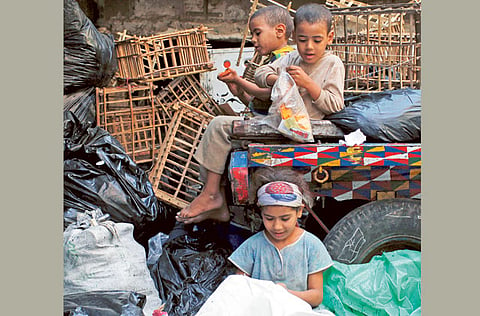Illiteracy dashes hopes of democracy in Egypt
Uneducated masses instinctively vote for those who they trust to solve their problems

Cairo: In a country where illiterate people constitute one-third of eligible voters, the concept of free elections is worrisome.
Nearly 16 million among the 53 million eligible voters cannot even read or write. Therefore, some liberal politicians believe there is no hope for democracy.
“We have an educated middle class on the one hand and on the other a majority known as Islamists and illiterates,” said Mohammad Al Baradei, former head of the National Salvation Front, a group opposed to the rule of the now ousted president Mohammad Mursi.
Regarding to the choice between a civic and a religious state — an essential aspect of the current political struggle in Egypt — Al Sayed Yassin, a veteran writer and consultant at Al Ahram Centre for Political and Strategic Studies, expects that the rates of voters for a civic state (23 per cent) and for a religious state (77 per cent) could be repeated.
“In the last two referendums, to amend the constitution March 2011 and to draw a new one December 2012, the 23 per cent of supporters of a civic state consists of Copts 15 per cent, liberals 3 per cent and a part of educated Muslims 5 per cent. The voters for a religious state include Muslim Brothers 15 per cent, Salafists 2 per cent, the illiterates 40 per cent and a part of educated Muslims 20 per cent. That is what we predict for the next election,” Yassin told Gulf News.
“It is a frustrating reality, but it could be changed with some planning and work on the ground. As the statistics indicate, only 45 per cent of registered voters went to vote and 4 million Egyptians rejected the idea of a religious state. We need to mobilise the 10 million Egyptians who support a civic state in the next voting for the new constitution, the parliament and the president,” the prominent writer added.
The decline of the Muslim Brotherhood may help gain more supporters of a civic state from other categories, but the biggest challenge will be trying to mobilise the illiterates in rural areas, according to Yassin.
“They may not understand or care about the crucial issues of the country and when they go to the ballot box,” he said. However, Jamal Al Tahawi, a sociology professor at Faculty of Arts, Minya University, believes that “the uneducated and illiterate aren’t beyond shifting allegiance once they realise they have been cheated. They don’t reach decisions on an irrational basis, but on that of experience and past mistakes. They can react to change and are not committed to one party forever.”
“They do indeed shift their allegiance if they are unhappy with the party they voted for,” he points out.
“Although the percentage of votes for religious right-wing radicals is highest in places where there are also high levels of illiteracy, it would be wrong to use that fact as a general reproach against the uneducated. The fact is that they instinctively side with whomever they most trust to solve their problems and vote for whomever is willing to do the legwork,” Al Tahawi said.
The writer is a journalist based in Cairo
Sign up for the Daily Briefing
Get the latest news and updates straight to your inbox



